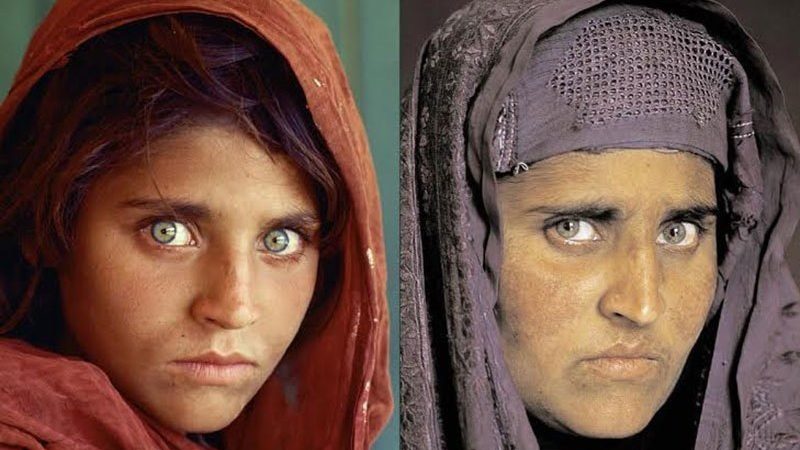Nat Geo’s ‘Afghan girl’ Sharbat Gula to be deported from Pakistan

Nat Geo’s famed ‘Afghan Girl’ Sharbat Gula is to be deported to Afghanistan after serving a 15-day jail sentence and paying a fine of Rs110,000, a special anti-corruption and immigration court in Peshawar ordered on Friday.
Sharbat Gula was arrested by the Federal Investigation Agency (FIA) on Oct 26 from her house in the Nauthia area for alleged forgery of a Computerised National Identity Card (CNIC). A day after her arrest, the United Nations High Commissioner distanced itself from Sharbat Gula, claiming that she was not a registered refugee.
Sharbat Gula’s lawyer, Mubashir, said the accused had pleaded guilty to all charges against her in court today.
He said she had served about nine days in jail since her arrest and will remain imprisoned for six more to complete her sentence before she is deported from Pakistan.
During a bail hearing before a special court earlier this week, Sharbat Gula’s lawyer said she is the sole bread winner of her family and is currently suffering from Hepatitis C.
Judge Farah Jamshed Khan, who dismissed Sharbat Gula’s bail petition on Nov 2, had directed the suspect be produced in court today and heard the case.
An interim challan submitted by the FIA on Nov 1 said the suspect had already admitted her guilt during her interrogation, an official in the know earlier said.
The official added that the Afghan woman had claimed that her late husband, Rehmat Gul, had earlier made a manual national identity card for her in 1988.
He added that Sharbat Gula admitted during interrogation that she had later visited the National Database and Registration Authority (Nadra) offices outside which she met an agent, who made her CNIC after receiving some money.
The FIA also registered an FIR on Oct 20 against three former Nadra employees for allegedly issuing CNICs to Sharbat Gula and two other Afghans shown as her sons.
The FIR says after the completion of inquiry and checking of Nadra records, it had been established that three employees of Nadra Peshawar offices including Palwasha Afridi, Mohsin Ehsan and Emad fraudulently issued Pakistani CNICs to Afghan nationals, including Sharbat Gula, Wali Khan and Rauf Khan.
The officials were charged under sections 409, 419, 420, 468, 471 and 109 of the Pakistan Panel Code, Section 5(2) of the Prevention of Corruption Act, and Section 30 of the Nadra Ordinance.
Palwasha Afridi and Mohsin Ahsan has secured pre-arrest bail from a court in the case, the third official has been absconding.
‘Mona Lisa of Afghan war’
Sharbat Bibi became famously known as the ‘Afghan Girl’ when National Geographic photographer Steve McCurry captured her photograph at the Nasir Bagh refugee camp situated on the edge of Peshawar in 1984 and identified her as Sharbat Gula.
She gained worldwide recognition when her image was featured on the cover of the June 1985 issue of National Geographic Magazine at a time when she was approximately 12 years old.
That photo has been likened with Leonardo Da Vinci’s Mona Lisa.
National Geographic also made a short documentary about her life and dubbed her the ‘Mona Lisa of Afghan war’.
She remained anonymous for years after her first photo made her an icon around the world and until she was discovered by National Geographic in 2002.
After Sharbat’s family granted her permission to meet with the man who photographed her 17 years ago, McCurry knew immediately, even after so many years, that he had found her again.
“Her eyes are as haunting now as they were then,” he had said.
Fate of Afghan refugees
Pakistan has been tackling the Afghan refugee crisis for over three decades; the UNHCR has acknowledged it as the “largest protracted refugee situation globally”.
It is estimated that some three million Afghan refugees are living in Pakistan, half of whom are unregistered.
Since 2009, Islamabad has repeatedly pushed back a deadline for them to return, but fears are growing that the latest cutoff date in March 2017 will be final.
The Human Rights Watch (HRW) has spoken against the forceful return of Afghanistan refugees from Pakistan, reminding the government of their obligation to protect all Afghans in the country, including those not registered as refugees.
Uncertainty about future, tightening of border controls, and security crackdown against foreigners living in Pakistan have already sped up the return process despite deteriorating security in Afghanistan due to increased attacks by Taliban and an aggravating economy.
The main factor driving the accelerated process is, however, said to be the documentation requirement for visits to Afghanistan. Doubling of cash grant by the UNHCR for voluntary returnees from $200 to $400 per individual and Pakistani incentive of free wheat for the relocated camps for three years are some of the other factors.
Besides harassment by law enforcement agencies, there are reports about increased negative attitudes of the community towards refugees due to involvement of some of them in the crime and terrorism.
Related News

Trump offers to help resolve conflict between India and Pakistan
WASHINGTON, May 8 (APP/DNA):US President Donald Trump urged India and Pakistan to cease fighting, sayingRead More

Azerbaijan Statement on escalation of tension between India and Pakistan
The Republic of Azerbaijan expresses its concern over the further escalation of tension between theRead More


Comments are Closed